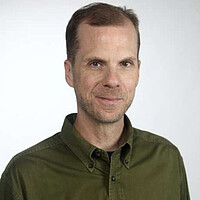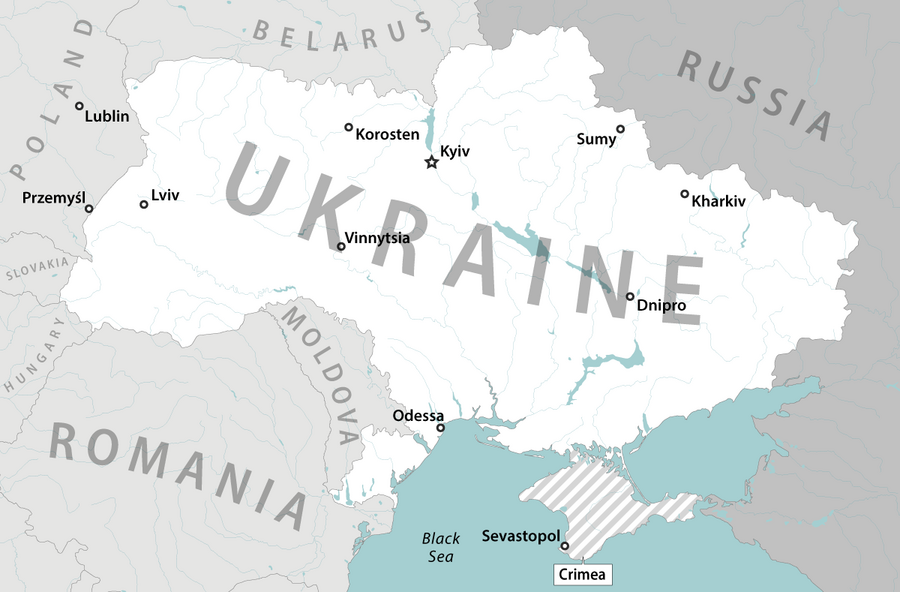Ukrainian refugees push westward, feeling both relief and sorrow
Loading...
| Lviv, Ukraine
Irina Kopil, the mother of two children, pulled into the train station in Lviv Tuesday morning, fleeing missile strikes in the city of Vinnytsia.
“You feel everything – anger, panic, fear, sadness,” says Ms. Kopil. In a murmur, she shares that her husband, a member of Ukraine’s territorial defense force, stayed behind. “We do not know when we will see each other again.”
Why We Wrote This
In Lviv, the last major city before the Polish border, a crush of Ukrainian refugees is relieved to be safe but anguished about all they’ve left behind as they rush toward the unknown.
Ms. Kopil and her children belong to the ever-rising tide of Ukrainians fleeing the country as Russia’s invasion enters its second week. More than 800,000 refugees have escaped as the Russian military escalates its attacks on cities across Ukraine.
The majority of those displaced by the war find safety in Poland. In Lviv, the last large city before the border, the train station has seen a crush of refugees, whose relief at eluding harm collides with sorrow over leaving home as they journey toward uncertainty.
Ivan Slotylo and Renata Kukul, a Lviv couple, arrived at the station to distribute food to fellow Ukrainians. Mr. Slotylo explains that while the war has largely spared the country’s west, residents here feel solidarity with those forced to flee.
“Putin didn’t just attack some of us. He attacked all of us,” Mr. Slotylo says. “Our country needs us.”
Mother held son in her arms as missiles and rockets thundered down on Kharkiv and the entire world sounded as if it might end. In an underground subway station in Ukraine’s second-largest city, Valeriya Portnianka and young Matvey huddled with hundreds of other residents, wondering if they would ever again walk up into the light.
One day blurred into the next, then another. On the fourth day, 94 hours after descending into the gloom, Ms. Portnianka gathered her son and their lone suitcase. They boarded a train from Kharkiv on Ukraine’s border with Russia to the capital of Kyiv, and from there continued west to Lviv. Some 22 hours later, forced to abandon home, work, and the order of life, she clasped Matvey’s hand as they waited to board a bus Tuesday bound for Poland.
“It was ...” She pauses to wipe away tears, her face wan beneath the hood of a blue wool coat. “It was nothing you can describe. It was a feeling of dying while you are alive.”
Why We Wrote This
In Lviv, the last major city before the Polish border, a crush of Ukrainian refugees is relieved to be safe but anguished about all they’ve left behind as they rush toward the unknown.
Ms. Portnianka and her son belong to the ever-rising tide of Ukrainians fleeing the country as Russia’s invasion enters its second week. More than 800,000 refugees have escaped to Poland, Hungary, Moldova, Slovakia, and Romania as the Russian military escalates its attacks on cities across the eastern two-thirds of Ukraine. Defense officials in Kyiv reported Wednesday that more than 2,000 civilians have died.
The majority of those displaced by the war find safety in Poland, where officials estimate that 50,000 Ukrainians arrive daily. In Lviv, the last large city before the border, the train station has seen a crush of refugees, whose relief at eluding harm collides with sorrow over leaving home as they journey toward uncertainty.
Irina Kopil, the mother of two children, pulled into the station Tuesday morning from Vinnytsia. The city of 375,000 people, southwest of Kyiv and home to the headquarters of the Ukrainian air force, has absorbed missile strikes as air-raid sirens blare day and night.
She joined two other mothers and their children from Vinnytsia on the ride to Lviv, and the group planned to catch another train later in the day across the border. From there they would travel to the Polish city of Lublin to stay with a host family and try to piece together the future.
“You feel everything – anger, panic, fear, sadness,” says Ms. Kopil, gray scarf wrapped around her neck against the winter cold. Her son giggles as he runs in circles nearby. In a murmur, she shares that her husband, a member of the country’s territorial defense force, stayed behind in Vinnytsia. “We do not know when we will see each other again.”
Wrenching separations
Women and children account for most of the train passengers arriving in and moving on from Lviv. Under a declaration of martial law, Ukrainian President Volodymyr Zelenskyy has required men ages 18 to 60 to remain in the country, seeking to fortify the country’s military.
Valeriy Zhylin escorted his teenage daughter, Maria, to Lviv from their village outside the city of Korosten, 40 miles south of Belarus, where Russian troops stationed along the border advanced into Ukraine last week.
“We hope that maybe in a week or two things will improve,” says Mr. Zhylin, a physical education instructor at a secondary school who has joined his village’s defense force. As Maria prepares to take a train to the Polish border town of Przemyśl, they turn toward each other and embrace. Their wordless grief gives way to tears.
Watching her climb aboard, he says, “I still cannot believe we are in this nightmare.”
Wrenching separations occur with each train departing for Poland. A group of people begs a conductor to board a car already packed with passengers. He relents after a time and allows several of them up the stairs before telling the others to wait for the next train due in four hours. He closes the door and brings his hands to his face as if in prayer, his eyes wet, his anguish apparent.
The discarded artifacts of innocents caught in the chaos of war lie scattered across the platform. Security guards gather the items – blankets, suitcases, backpacks – and stack them against a wall. An abandoned baby stroller stands beside the tracks as a train begins rumbling westward.
The Russian invasion has destroyed daily routines and long-sought dreams. Days before Russian President Vladimir Putin ordered troops across the border, Natalia Tkachenko received a notice of approval for a visa to move to the United States.
She intended to join her husband in Texas later in March. But her final appointment to obtain the visa was scheduled for this week. So on Tuesday, Ms. Tkachenko, a lab technician in the eastern city of Dnipro, stands beside a train headed to Poland, along with her two sisters and their five children.
“Now everything has changed,” she says, clutching her passport and bringing a hand to her forehead. “I am terrified. I have no answers.”
A deep solidarity
The city of Lviv has rallied to the cause of aiding refugees passing through to Poland and other countries. Volunteers hand out sandwiches, bottled water, and blankets to the mass of travelers inside the train station. Blue tents set up outside by the fire and police departments provide space for people to stay warm and charge mobile devices.
Ivan Slotylo and Renata Kukul, a husband and wife who live in Lviv, showed up at the station in the morning to help distribute food and information to their exhausted fellow Ukrainians. Mr. Slotylo, a web designer, explains that while the war has spared the country’s western region for the most part, residents here feel a deep solidarity with those forced to flee home.
“Putin didn’t just attack some of us. He attacked all of us,” Mr. Slotylo says. “Our country needs us.”
A few blocks from the train station, in an art gallery complex converted into a collection center for donated goods, volunteers organize care packages with canned goods, toilet paper, water, and other essential items. They send the packages to villages and military units in the region as the commercial supply chain falls apart.
Yuri Popovych, a volunteer coordinator at the site and the owner of a software development firm, relates that the hub started operating three hours after Russia invaded Ukraine. He chokes up describing why he participates in the effort.
“This is a war that will leave scars on the souls of our people for generations,” he says. “You can’t just do nothing.”
A broader sense of cooperation has spread across the European Union in response to the war. A proposal to extend temporary asylum for up to three years to Ukrainian refugees entering the union’s 27 member countries appears headed toward approval this week.
The prospect of a warm welcome elsewhere in Europe offers a measure of solace to Nastia Grebenkova. The university student traveled alone across the length of the country this week, arriving by train in Lviv after a 27-hour journey from the northeastern city of Sumy, where she studies ecology.
Ms. Grebenkova, who wears a gray knit cap the color of her dyed hair, escaped as Sumy endured heavy shelling by Russian forces. Waiting to board a train to Przemyśl, she admits that her outward calm conceals a fear that she will never again set foot in her homeland.
“I am 18 years old,” she says, “and I worry I am now without a country.”













